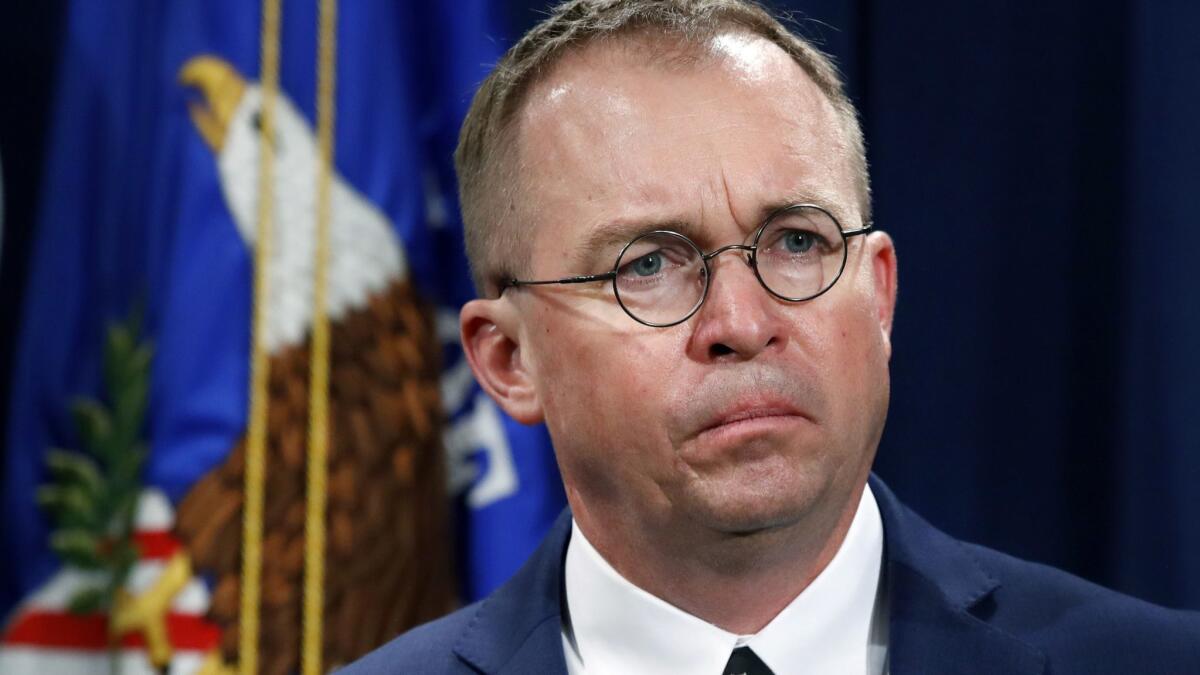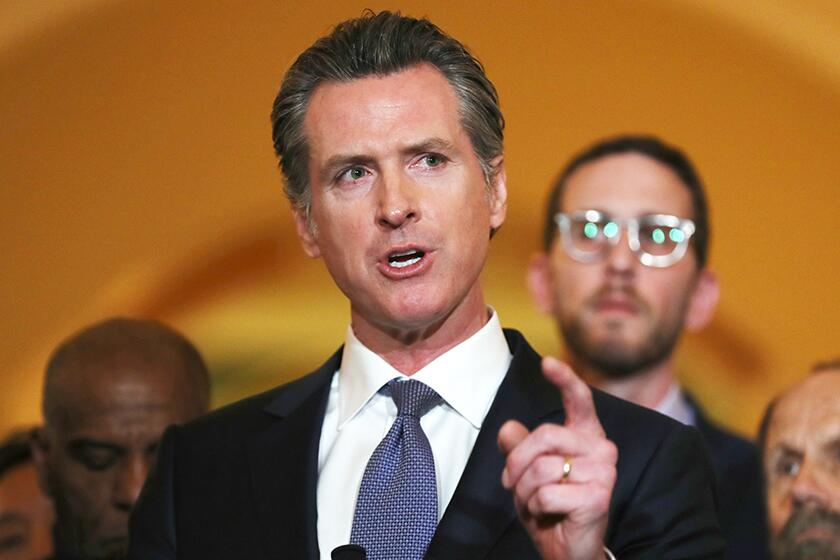Trump replaces Chief of Staff Mulvaney with close ally Meadows

- Share via
WASHINGTON — Mick Mulvaney, President Trump’s third and least powerful chief of staff, was replaced Friday by North Carolina Rep. Mark Meadows, an announcement Trump made in an evening tweet.
Trump named Mulvaney special envoy to Northern Ireland after a 14-month tenure in which he made few, if any, attempts to curb the president’s often impulsive actions and statements.
Meadows, one of the most conservative members of the House since 2013, has been a staunch Trump defender and leading surrogate during the recent impeachment.
Meadows was one of the most disruptive members of Congress during the rise of the tea party, filing a motion to remove Republican House Speaker John A. Boehner in 2015 that helped lead to his resignation. Meadows announced in December that he would not seek reelection to the House this year, fueling speculation that he would take a job in the Trump administration.
Mulvaney, a former member of Congress from South Carolina, made his name in Trump’s orbit as a utility player, willing to take on three different jobs, two of them on an acting basis, and eager to subsume his own beliefs in the service of Trump’s.
He ascended to the chief of staff’s post in January after the departure of John F. Kelly, a retired general who as chief of staff became marginalized after he attempted to impose more discipline on the president’s decision-making process and restrict the access that some of Trump’s friends and informal advisors enjoyed.
Trump made it clear that he resents such restrictions and, at least initially, was comfortable with Mulvaney’s laid-back approach. As the onetime congressman gradually surrounded himself in the West Wing with a cadre of loyal aides, he worked to foster a collegial working environment and to avoid confrontation with his boss. He kept a popcorn machine in his office and, for the most part, sat back and watched the show.
But Trump, who prefers to keep staffers on a short leash, never gave Mulvaney the formal title of chief of staff, calling him “acting chief of staff” throughout his tenure. Though Mulvaney said he did not mind the slight, it was a constant reminder that his lease on the job was subject to Trump’s whims.
His most notable and publicly embarrassing moment came in October, when he held a rare White House news briefing to announce and defend Trump’s decision to host the Group of 7 conference of world leaders at his resort in south Florida. After insisting Trump would not make a profit, advertising the hotel’s amenities from the White House lectern and dismissing concerns about self-dealing, Mulvaney further jeopardized Trump’s defense against the Democratic-led impeachment inquiry.
He said Trump had temporarily held up nearly $400 million in congressionally approved aid to Ukraine until President Volodymyr Zelensky satisfied three conditions, including Trump’s request that the government investigate Democrats, and a debunked claim that Ukraine played a role in influencing the 2016 election.
“I have news for everybody: Get over it. There’s going to be political influence in foreign policy,” Mulvaney said — words that quickly became emblematic of his view of Trump’s powers.
The news conference proved disastrous. Trump angrily canceled his plans to host the G-7 at his hotel, and Mulvaney struggled to walk back his statements regarding Ukraine. But the admission struck at the heart of the impeachment inquiry, seeming to confirm a quid pro quo with Ukraine that Trump publicly denied.
That messy performance, coming on top of other poorly executed gambits, increasingly rankled Jared Kushner, the president’s senior advisor, son-in-law and one of the few administration officials with significant and lasting influence.
Mulvaney, who was named by witnesses as a key player in helping Trump withhold the aid money, later defied a House subpoena to testify in the impeachment investigation at the request of Trump.
“From day one, Mulvaney abdicated the most important duty of any White House chief of staff, which is to be able to tell the president what he doesn’t want to hear,” said Chris Whipple, author of “The Gatekeepers: How the White House Chiefs of Staff Define Every Presidency.”
“The fundamental problem is not Mulvaney. It’s the fact that this president has never been interested in having an empowered chief of staff,” Whipple continued. “This is what you get when you have a chief whose philosophy is to ‘Let Trump be Trump’: There’s no process and that’s dangerous for domestic policy and especially foreign policy.”
Mulvaney did not try to prevent Trump from tweeting or from making impulsive comments in calls with foreign leaders. And he worked strenuously to defend Trump in public. But over time, as he looked to assert more influence behind the scenes, he clashed with several top aides, according to two senior administration officials.
In September, White House Counsel Pat Cipollone fought Mulvaney about the decision to release a summary of the president’s July 25 phone call with Zelensky that became the center of the House impeachment inquiry, the officials said.
They also clashed over Mulvaney’s ham-handed attempt to bring in a friend, former Rep. Trey Gowdy (R-S.C.), as part of the president’s legal team mainly to carry Trump’s public defense on television. News of Gowdy’s hiring was leaked to the press and Trump announced it before aides realized that House ethics rules, which require former members to take a one-year time-out upon leaving office before lobbying their former colleagues, would prevent Gowdy from beginning his work until January, probably after the impeachment inquiry has run its course.
Before working for Trump, Mulvaney as a South Carolina congressman made his name in the fiscally conservative tea party movement.
During the 2016 election, he called Trump a “terrible human being” after the release of the “Access Hollywood” tape that revealed Trump speaking crudely about sexually assaulting women. Before that, Mulvaney supported a government shutdown during the Obama administration because of what he called a core belief in shrinking the budget deficit.
Yet he abandoned both of those convictions when Trump chose him at the beginning of his tenure to lead the Office of Management and Budget, making him the top White House advisor on spending matters.
In addition to serving as budget chief, Mulvaney also took on the role of acting director of the Consumer Financial Protection Bureau for more than a year. Like many conservatives, he was a fierce critic of the agency, eager to use his job to curb regulations on the financial industry that had begun under President Obama.
Though Trump vowed to eliminate both the deficit and the national debt, he showed little regard for balance sheets once he took office, pushing massive tax cuts along with billions in spending on projects such as the promised wall at the border and significant increases in military outlays.
Deficits under Trump, nearly $1 trillion in the most recent fiscal year, have far exceeded Obama’s record, despite a relatively healthy economy.
Mulvaney has put up little resistance.
Meadows, who turned down an offer to become Trump’s chief of staff last year just before Mulvaney’s appointment was announced, responded to the president’s approval of a massive spending bill by noting that his former House colleague was “not winning on some of the fiscal issues down at the White House.”
Defiant in an interview with the Atlantic, Mulvaney recalled his response to Meadows: “I told him, ‘Yeah, but at least I’m losing at the very highest levels.’”
More to Read
Get the L.A. Times Politics newsletter
Deeply reported insights into legislation, politics and policy from Sacramento, Washington and beyond. In your inbox twice per week.
You may occasionally receive promotional content from the Los Angeles Times.












